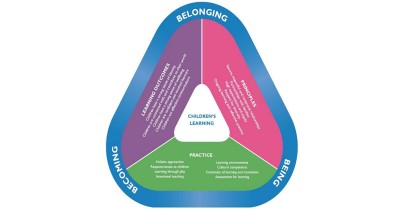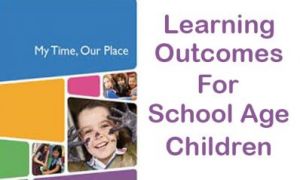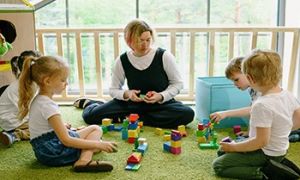The My Time Our Place Framework provides broad direction for school age care educators in settings to facilitate children’s play, leisure and learning.
It guides educators in their program decision-making and assists in planning, implementing and evaluating quality in school age care settings.
It also underpins the implementation of more specific experiences relevant to each local community and school age care setting.
Concepts Of The MTOP
Belonging, Being & Becoming
School age children experience learning in a wide range of settings. Family, school and the community (including school age care settings) provide diverse opportunities for children to explore relationships and ideas, and build competence and skills. The diversity in family and community life means that school age children experience belonging, being and becoming in many different ways. They bring their diverse experiences, perspectives, expectations, knowledge and skills to their learning.
Belonging
Experiencing belonging – knowing where and with whom you belong – is integral to human existence. In school age care, and throughout life, relationships are crucial to a sense of belonging. Children belong first to a family, a cultural group, a neighbourhood and a wider community. Belonging acknowledges children’s interdependence with others and the basis of relationships in defining identities. Belonging is central to being and becoming in that it shapes who children are and who they can become.
Being
The Framework is designed to inspire conversations, improve communication and provide a common language about children’s play, leisure and learning among children themselves, their families, the broader community, school age care educators and other professionals.
Becoming
Children’s identities, knowledge, understandings, capacities, skills and relationships change during childhood. They are shaped by many different events and circumstances. Becoming acknowledges children’s ongoing learning and development. It emphasises learning to participate fully and actively in society.
Principles, Practices and Learning Outcomes
The Framework puts children’s wellbeing and learning at the core and comprises three inter-related elements: Principles, Practice and Outcomes. All three elements are fundamental to pedagogy and program decision-making in school age care.
Principles
There are five Principles that reflect contemporary theories and research evidence concerning children’s play, leisure and learning and pedagogy. In school age care settings the Principles underpin practice that is focused on collaborating with all children to make progress in relation to the Outcomes.
Secure, respectful and reciprocal relationships - Children, who are supported to understand themselves in this positive
way, experience a sense of belonging that nurtures the development of their self esteem. Self esteem is critical to children’s capacity to develop positive images about their abilities, interests and personal future. Exhibiting qualities of fairness, humour, sympathy and understanding builds respectful and trusting relationships with children, families, colleagues and other professionals. Educators foster independence and initiative thereby nurturing children’s agency and leadership skills.
Partnerships - Children have the potential to be affected by people, places and events. Families, schools and local communities contribute to the opportunities provided for this age group. Educators recognise that families are children’s first and most influential teachers. They create a welcoming environment where all children and families are respected and actively encouraged to collaborate with educators about program decisions in order to ensure that experiences are meaningful. Partnerships are based on effective communication which builds the foundations of understanding about each other’s expectations and attitudes, and build on the strength of each others’ knowledge.
High expectations and equity - School age care educators who are committed to equity believe in all children’s capacities to access opportunities and succeed, regardless of diverse circumstances and abilities. They nurture children’s optimism, happiness and sense of fun. Children progress well when they, their parents, educators and the community hold high expectations for achievements and contribution to the society.
Respect for diversity - There are many ways of living, being and of knowing. Children are born belonging to a culture, which is not only influenced by traditional practices, heritage and ancestral knowledge, but also by the experiences, values and beliefs of individual families and communities. Being aware of and understanding diversity in school age care means taking into account the context of different family practices, values and beliefs. Educators endeavour to understand the histories, cultures, languages, traditions, child rearing practices and lifestyle choices of families so they can better support children in their care. They value children’s different capacities and abilities.
Ongoing learning and reflective practice - Reflective practice is a form of ongoing learning that involves engaging with questions of philosophy, ethics and practice. Its intention is to gather information and gain insights that support, inform and enrich decision-making about children’s wellbeing and development. As professionals, educators examine what happens in their settings and reflect on what they might change. Critical reflection involves closely examining all aspects of events and experiences from different perspectives. Educators often frame their reflective practice within a set of overarching questions, developing more specific questions for particular areas of enquiry.
Practices
The principles of school age care pedagogy underpin practice. Educators draw on a rich repertoire of pedagogical practices to promote children’s learning.
Holistic approaches - School age care educators take a holistic approach to their roles and responsibilities recognising the
connectedness of mind, body and spirit. They focus attention on children’s physical, personal, social, emotional and spiritual wellbeing as well as cognitive aspects of learning as it pertains to lifelong learning. They are particularly concerned with how children’s social and physical development and wellbeing impacts on capacity and potential to become effective citizens. Each outcome is viewed as being integrated and interconnected.
Collaboration with children - School age care educators are responsive to all children’s strengths, abilities and interests. They value and build on children’s strengths, skills and knowledge to ensure their wellbeing and motivation and engagement in experiences. They respond to children’s expertise, cultural traditions and ways of knowing, the multiple languages spoken by some children, particularly Aboriginal and Torres Strait Islander children, and the strategies used by children with additional needs to negotiate their everyday lives. Responding to children’s ideas and play forms an important basis for program decision-making. In response to children’s evolving ideas and interests, educators assess, anticipate and extend children’s ideas via open ended questioning, providing feedback, challenging their thinking and guiding their actions.
Learning through play - Play and leisure activities provide opportunities for children to learn as they discover, create, improvise and imagine. When children play with other children they create social groups, test out ideas, challenge each other’s thinking and build new understandings. Play provides a supportive environment where children can ask questions, solve problems and engage in critical thinking. Play can expand children’s thinking and enhance their desire to know and to learn. In these ways play can promote positive dispositions towards learning. Children’s immersion in their play illustrates how play enables them to simply enjoy being.
Intentionality - Intentionality refers to actions that are deliberate, purposeful and thoughtful. Educators who engage in
intentional actions recognise that learning occurs in social contexts, and that interactions and conversations are vitally important for learning. They actively promote children’s learning through worthwhile and challenging experiences and interactions that foster high-level thinking skills and they seize opportunities in activities and conversations to extend or affirm children’s learning. They listen with intent to the conversations of children and use strategies such as modelling and demonstrating, open questioning, speculating, explaining, engaging in shared thinking and problem solving to extend children’s thinking and learning.
Environments - School age care environments are welcoming spaces when they reflect and enrich the lives and identities of children and families participating in the setting in response to their interests and needs. Environments that support wellbeing and development are vibrant and flexible spaces that are responsive to the welfare and abilities of each child. They cater for different needs and interests and invite children and families to contribute ideas and questions. Educators can support engagement by allowing time for meaningful interactions, by providing a range of opportunities for individual and shared experiences, and by finding opportunities for children to go into and contribute to their local community.
Cultural competence - Educators who are culturally competent respect multiple cultural ways of knowing, seeing and living, celebrate the benefits of diversity and have an ability to understand and honour differences. This is evident in everyday practice when educators demonstrate an ongoing commitment to developing their own cultural competence in a two way process with children, families and communities. Educators view culture and the context of family as central to children’s sense of being and belonging, and to success in lifelong learning. Educators also seek to promote children’s cultural competence.
Continuity and transitions - School age care settings are situated in complementary relationships with homes, schools and community spaces with different places and environments having their own purposes, expectations and ways of doing things. In learning life skills children draw on the understandings, skills and attitudes from the range of settings in which they engage. Educators work with children, families, other professionals and the broader community to ensure successful transitions between settings and that children feel secure and confident. They assist children to understand the traditions, routines and practices of the settings to which they are moving and to feel comfortable with the process of change.
Evaluation for wellbeing and learning - Educators gather knowledge about children’s wellbeing and learning as they reflect and engage in processes such as scanning, monitoring, gathering and analysing information about how children feel and what children know, can do and understand. It is part of an ongoing cycle that includes planning, documenting and evaluating children’s wellbeing, development and learning.
Learning Outcomes
The five Outcomes in this Framework, provide school age care educators with key reference points against which children’s experiences can be identified, documented and communicated to children, families and other professionals.
The outcomes are broad and observable. They acknowledge that children in school age care settings have choices and opportunities to collaborate with each other and educators. Children learn in a variety of ways and vary in their capabilities and pace of learning. Considerations need to be given to time and place. Children engage with increasingly complex ideas and learning experiences, which are transferable to other situations.
The points described within each outcome are relevant to children of all ages. Knowledge of individual children, their interests, strengths and capabilities will guide educators’ professional judgement to ensure all children are engaging in a range of experiences across all the Outcomes in ways that optimise their wellbeing and capabilities
For further information on the five Learning Outcomes, key components of learning as well as points of evidence that children may display and examples of ways to promote this learning see the following:
- Children have a strong sense of identity
- Children are connected with and contribute to their world
- Children have a strong sense of wellbeing
- Children are confident and involved learners
- Children are effective communicators
How Educators Can Promote MTOP Learning Outcomes
How Children Can Achieve MTOP Learning Outcomes
In order to engage children actively in learning, educators identify children’s strengths and interests, choose appropriate strategies and design the environments. The Framework supports a model of program decision-making as an ongoing cycle. This involves educators drawing on their professional knowledge, including their in-depth knowledge of children. In collaboration with children and families, educators carefully evaluate to inform further planning.
Children in school age care settings have choice and control over their learning as they collaborate with educators to extend their life skills and develop dispositions towards citizenship.
Reference:
My Time Our Place, Framework For School Age Care In Australia, Department of Education and Training



 Here is the list of the EYLF Learning Outcomes that you can use as a guide or reference for your documentation and planning. The EYLF
Here is the list of the EYLF Learning Outcomes that you can use as a guide or reference for your documentation and planning. The EYLF The EYLF is a guide which consists of Principles, Practices and 5 main Learning Outcomes along with each of their sub outcomes, based on identity,
The EYLF is a guide which consists of Principles, Practices and 5 main Learning Outcomes along with each of their sub outcomes, based on identity, This is a guide on How to Write a Learning Story. It provides information on What Is A Learning Story, Writing A Learning Story, Sample
This is a guide on How to Write a Learning Story. It provides information on What Is A Learning Story, Writing A Learning Story, Sample One of the most important types of documentation methods that educators needs to be familiar with are “observations”. Observations are crucial for all early childhood
One of the most important types of documentation methods that educators needs to be familiar with are “observations”. Observations are crucial for all early childhood To support children achieve learning outcomes from the EYLF Framework, the following list gives educators examples of how to promote children's learning in each individual
To support children achieve learning outcomes from the EYLF Framework, the following list gives educators examples of how to promote children's learning in each individual Reflective practice is learning from everyday situations and issues and concerns that arise which form part of our daily routine while working in an early
Reflective practice is learning from everyday situations and issues and concerns that arise which form part of our daily routine while working in an early Within Australia, Programming and Planning is reflected and supported by the Early Years Learning Framework. Educators within early childhood settings, use the EYLF to guide
Within Australia, Programming and Planning is reflected and supported by the Early Years Learning Framework. Educators within early childhood settings, use the EYLF to guide When observing children, it's important that we use a range of different observation methods from running records, learning stories to photographs and work samples. Using
When observing children, it's important that we use a range of different observation methods from running records, learning stories to photographs and work samples. Using This is a guide for educators on what to observe under each sub learning outcome from the EYLF Framework, when a child is engaged in
This is a guide for educators on what to observe under each sub learning outcome from the EYLF Framework, when a child is engaged in The Early Years Learning Framework describes the curriculum as “all the interactions, experiences, activities, routines and events, planned and unplanned, that occur in an environment
The Early Years Learning Framework describes the curriculum as “all the interactions, experiences, activities, routines and events, planned and unplanned, that occur in an environment


